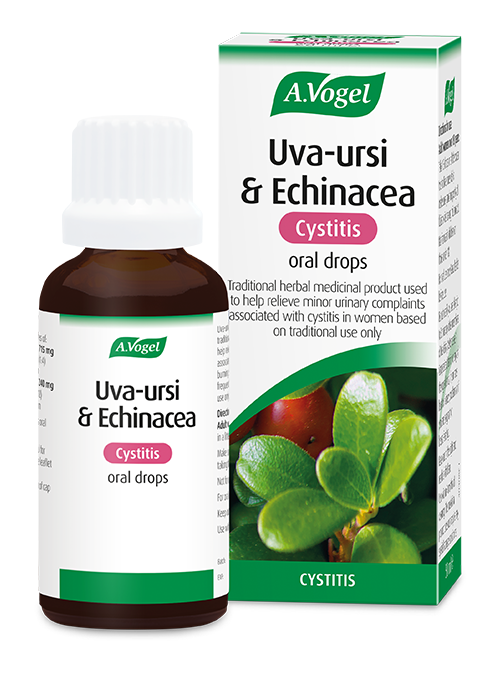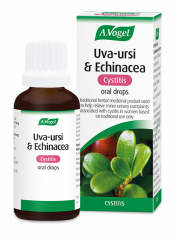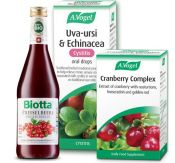Is there a link between UTIs and thrush?
Whilst the bacteria that contribute to UTIs or cystitis are quite distinct from the yeast that give rise to episodes of thrush, changing or imbalanced micro-organisms in either the vagina or bladder, can easily translate into other unwanted symptoms nearby – since these areas are also in such close proximity.
Now, if you've ever had cystitis, a UTI or thrush, you'll know how unpleasant they can be, and how they can really interfere with your daily life, even if just for a couple of days! If you've ever experienced them at the same time, or one directly after the other, you'll also appreciate how much worse this is!
But why exactly do these two conditions often go hand in hand for certain people?
Another main connection between these two conditions, aside from their location and their tendency to affect mainly women, is that they can have very similar causes.
So, if you suffer from both routinely – it can be really helpful to understand some of these likely, shared causes.
Are thrush and UTIs related?
When we start to explore what these two conditions are, and what causes them, we begin to see some clear connections.
Firstly, thrush is caused by an overgrowth of Candida albicans, a yeast found naturally in the intimate area and the gut. However, an overgrowth can easily give rise to itching and thick, sometimes clumpy, white /yellowy vaginal discharge.
Cystitis, on the other hand, is the inflammation of the bladder and is usually caused by a bacterial infection. But urinary tract infections can also occur at any other point along the urinary tract – either down towards the urethra, or up towards the kidneys. They generally cause symptoms including a burning sensation when peeing, a frequent, urgent need to urinate, pelvic pain and cloudy urine.
Therefore, the first major connection between the two conditions is that they are both caused by micro-organisms. Therefore, one condition does not necessarily cause the other, but rather, due to this common cause, the factors that can put you at risk of developing one, may also likely put you at risk of developing the other.
What common factors are involved?
Identifying the risk factors involved with both conditions helps to highlight the connection between them:
1. Gut bacteria
Our natural flora plays an important role in both conditions. All of us have a rich population of naturally-occurring bacteria and yeasts in our gut and intimate areas, so upsetting this balance can cause either yeast populations, like Candida albicans, to grow out of control, or bacterial infections such as those that cause cystitis to grow – or both at the same time if you’re really unlucky!
2. Immune health
If your immune system is not working efficiently, you can struggle to fight off invaders, leaving you vulnerable to both cystitis and thrush.
The immune system can easily be weakened by colds and flu, as well as a poor, nutrient-deplete, or overly inflammatory diet.
Plus, long-term suppression of the immune system can mean that these infections may come back again and again.
3. Diet
A poor diet can therefore contribute to both conditions, since, eating a limited diet means that you risk, not only lacking in the vital nutrients that support the immune system, but it also creates an environment in which friendly bacteria struggle to survive; leaving yeasts and unfriendly bacteria free to multiply unchecked.
4. Antibiotic use
Antibiotic use, either present or historic, can also be a major contributing factor.
See, people tend to forget that antibiotics don’t have a strong preference over which bacteria they kill – both friendly and unfriendly bacteria can come under the firing line. This can leave yeast free to multiply unchecked too, but it also leaves you at risk of developing a bacterial infection if your unfriendly bacteria end up multiplying quicker than your friendly bacteria.
If you use antibiotics routinely to treat your cystitis, you may find that thrush follows on a few days later.
5. Hormone imbalance
Low oestrogen states (for example, as a result of menopause or PMS) could potentially have some negative effects.
See, oestrogen is generally quite lubricating and protective – remember, dryness can mean damage to the delicate cells lining your vagina or urinary tract, which can give unhelpful micro-organisms the opportunity they need to gain access.
So, if you're able to identify a hormone imbalance, plus, support this with supplement options such as a source of fermented soy isoflavones, this can often be a helpful step in the right direction.
6. Excess itching
One final thing to consider is the fact that one of the most common symptoms of thrush is itching. Itching your intimate area is a really easy way to transfer bacteria in and around the delicate urethra, particularly if you scratch with unwashed hands! Given the chance, this bacteria can then travel up towards the bladder and give rise to a UTI or cystitis.
Home remedies to reduce the risk of developing either condition
Since we now know what kinds of factors are involved in both conditions, it becomes easier to take measures to help prevent both conditions from developing:
1. Diet
What you eat can play a vital role in both conditions, so adjusting your diet can often be an important step. Some tips I often recommend, include:
- Reducing your intake of refined sugar and simple carbohydrates, such as white bread and white pasta – yeast and unfriendly bacteria thrive on these, so don't give them the chance! Seeds and nuts are packed full of nutrients and make a great replacement for sugary snacks!
- Increasing your intake of fresh fruit and vegetables. And variety is most defintiely key - a wide range is especially important to provide the vitamins, minerals and nutrients (including vitamin C and zinc) which help support your immune system. I would also recommend making an extra effort to increase your intake of green, leafy vegetables such as spinach, kale and broccoli, which are especially good for your good gut bacteria
- Reduce your intake of 'yeasty' foods such as cheese, alcohol, and bread made with yeast.
For more detailed dietary advice, have a look at my blog post ondiet and cystitis, as many of these tips will be relevant for thrush too.
2. Pre- and probiotics
Aside from improving your diet, introducing a probiotic supplement can often help. Optibac have a great range, and their probiotics for women are clinically proven to reach the intimate area alive.
And another top tip – taking our prebiotic, Molkosan, alongside your probiotics can help to create an optimal environment in which the healthy bacteria you're adding will thrive.
There's no point spending money on good-quality probiotics if these bacteria are just going to die off too!
Remember to take a probiotic alongside a course of antibiotics too, should you need to take these. Again, Optibac does specific types for this requirement.
3. Hygiene practices
I also recommend making a special effort to be more conscious of hygiene practices. Now that we understand the some of the causes such as the impact of microorganisms, we can appreciate how daily habits could impact these little critters - both the 'good' and 'bad' types!
So, it might seem slightly odd when talking about being more conscious of hygiene practices, that you may actually want to stop using harsher chemical soaps and washes for your intimate area, as these could actually upset your natural balance of bacteria and yeast further.
This area is fairly self-cleaning, actually, so some clean, warm water, and a very gentle, natural cleanser is usually all you shoyuld need to freshen up.
Just also make sure to wash your hands in clean, hot water and a gentle, natural soap before going anywhere near your intimate area.
Are there any herbal remedies to help?
There are a number of herbal remedies that you can use to manage these symptoms.
Uva-ursi is great for treating cystitis, as it helps to cleanse the bladder. It is also a great treatment choice for people prone to thrush because it doesn't upset your natural balance of bacteria in the way that antibiotics do.
Cranberry is also a popular treatment for cystitis, but unfortunately many people drink sugary, from-concentrate cranberry juice, which is not all that helpful. Instead, why not try our Biotta Cranberry Juice which contains only a natural source of sugar. You might also want to also read up on what some of the research says around Cranberry Juice for cystitis - all very interesting!
Our Cranberry Complex could also be an option for you. This contains cranberry as well as other herbs like fresh horseradish, golden rod and nasturtium which are all used traditionally for urinary tract health. This, along with our Golden Rod tea, can be taken every day to help keep cystitis as bay.
I would also recommend taking Echinacea as this helps to strengthen the immune system. In addition, vitamin C is vital for immune function, so taking Nature-C may also be beneficial.
Finally, Menopause Support may also be helpful, depending on the likelihood that hormone imbalances could also be having a part to play.
Originally published October 2016, updated July 2022










